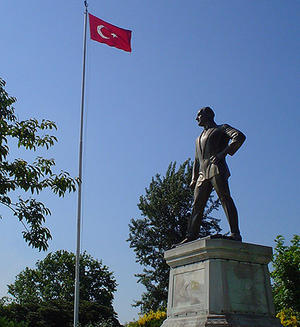As I Was Saying // by Ben FrankelQuo Vadis Turkey?
The Sunday, 12 September referendum in which 58 percent of the voters approved reforms in the Turkish constitution — reforms which would limit to ability of the courts and the military to protect Turkey’s secularist tradition — may lead to changes in Turkey’s domestic and foreign policies, but it is not yet clear how far Erdogan’s Islamist government will go in pushing these changes, and what countervailing forces, domestic and foreign, the government will encounter

Mustafa Kemal Ataturk, Turkey's founder // Source: euroheritage.net
In a referendum held on Sunday, 12 September, a series of reforms to the Turkish constitution was passed by a vote of 58 percent to 42 percent. Turkey’s fire-brand prime minister, Recep Tayyip Erdogan, and his governing Islamist Justice and Development Party, or AKP, supported the reforms, while the secularist Republican People’s Party, or CHP, opposed them.
Erdogan’s victory appear to pave the way for a success in his effort next year to win a third term as prime minister.
The referendum was fought over specific clauses in the Turkish constitution, but the deeper, more fundamental issue was the future of Kemalism as Turkey’s governing philosophy. Kemalism, named after Mustafa Kemal Ataturk, who was the founder and first president of the Turkish Republic in 1923, was a sweeping and radical ideology for a Muslim country that was just coming to terms with the collapse of the Ottoman Empire.
Within a few years, Ataturk had introduced a series of reforms, the short list of which include giving women the vote, closing the religious schools and courts, placing organized Islam under state control, and banning all clerical dress outside places of worship. The call to prayer had to be recited in Turkish, not Arabic, and the Perso-Arabic script was scrapped, replaced by the Latin alphabet.
As Judy Dempsey notes, such profound changes, introduced in the name of nationalism, modernization, and Westernization, pitted the more urbanized, European-oriented elites against the rural traditional population — a schism that was still apparent during the run-up to the referendum Sunday.
This is why the referendum on Sunday was about more than the popularity of Erdogan and his party. Analysts correctly say it was about something much more fundamental. “The referendum was about the different cultural values held by the conservatives and the secularists,” said Ozgur Unluhisarcikli, director of the Ankara office of the German Marshall Fund of the United States. “It was about the future identity of the country.”
The future identity of Turkey is in the balance because the Turkish courts and the Turkish military — the two institutions which, during the last eighty years, have been the resolute guardians of the Kemalite legacy — have been considerably weakened by the referendum.
Which direction will Turkey go, in both its domestic and foreign policies, now that the Islamist alternative to Kemalism has gained more room to maneuver while the Kemalites, at least for the moment, appear weakened?
The answer is not as
